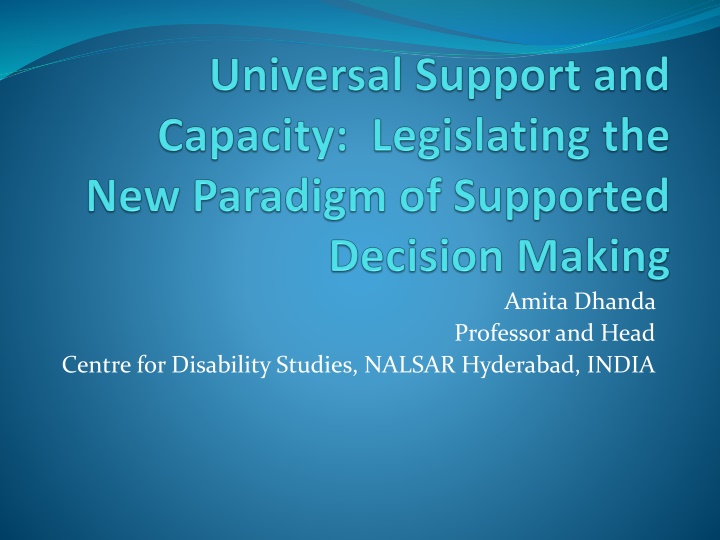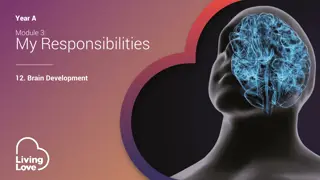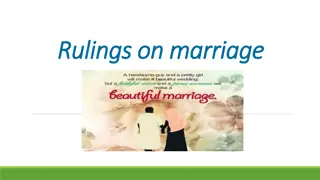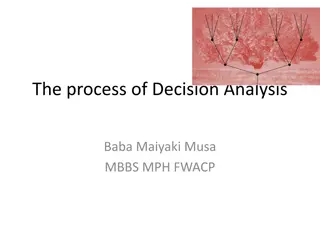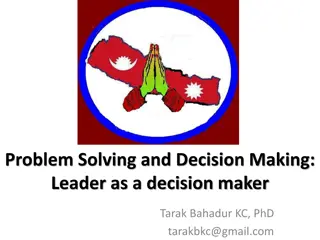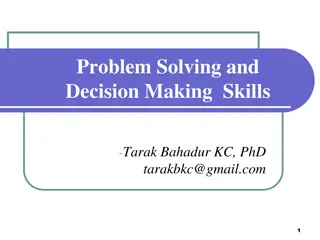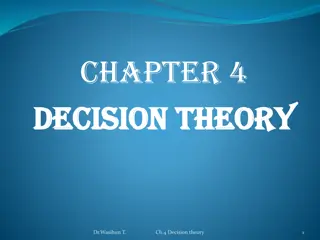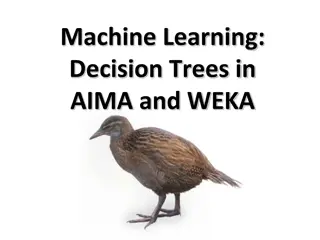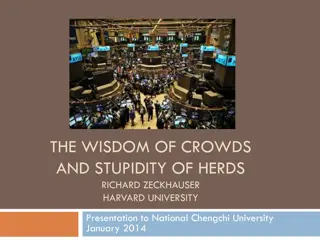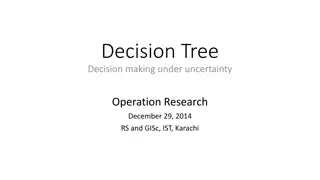Legislating for Supported Decision-Making
Amita Dhanda, Professor and Head at the Centre for Disability Studies in NALSAR Hyderabad, India, addresses the challenges in legislating for the new paradigm of supported decision-making. Examining the shift from old to new paradigms of support, she emphasizes the importance of support as a duty, not entitlement. The presentation delves into the necessity of support for human interaction and how support is crucial for the effectiveness of supported decision-making.
Download Presentation

Please find below an Image/Link to download the presentation.
The content on the website is provided AS IS for your information and personal use only. It may not be sold, licensed, or shared on other websites without obtaining consent from the author.If you encounter any issues during the download, it is possible that the publisher has removed the file from their server.
You are allowed to download the files provided on this website for personal or commercial use, subject to the condition that they are used lawfully. All files are the property of their respective owners.
The content on the website is provided AS IS for your information and personal use only. It may not be sold, licensed, or shared on other websites without obtaining consent from the author.
E N D
Presentation Transcript
Amita Dhanda Professor and Head Centre for Disability Studies, NALSAR Hyderabad, INDIA
Central Question being Addressed in Presentation Background Facts -Dilemma before Treaty Body - Challenges Faced in the Croatian Law Reform Process Central Question How to legislate for the New Paradigm of Supported Decision Making ?
What is a new paradigm ? When the underlying basis of a concept breaks away from the past and makes a new beginning. In the CRPD this new beginning has happened in the creation of this regime of universal legal capacity and support. Only Examining the New Paradigm of Support
Old and New Paradigms of Support Old Paradigm of Support New Paradigm of Support Recipient exception to the self-sufficiency rule Persons needing support become lesser beings Needed by minority hence not matter of priority Underlying basis the inadequacies, vulnerabilities and dependence of some beings Accepts that not needed by some but by all Life cycle approach and feminist analysis brings home this truth Not a us and them matter Underlying basis human interdependence
Support Duty Not Entitlement Entitlement Duty Its presence could be made integral to the exercise of legal capacity If duty it is correlative to right to legal capacity Thus the choice to take or not take the support resides with the person with disability Support in harmony with legal capacity being acceptable and support which militates against it could be refused. absence of support could then be the reason for denying legal capacity Also persons seeking it would need to prove they deserve it Thus yet again to ask for support one would need to become less
Support to Marshal Support legislating for support should facilitate human interaction No one alone Especially relevant for people in institutions
Support and supported decision- making SDM is a species of support SDM cannot happen without support Text of the CRPD speaks of support Support is a prerequisite for any system of SDM to flourish Absent a supporting environment, SDM would be substitution by another name.
Two Way Inclusion Legislating for support in universal terms ensures that persons with disabilities are not just seeking inclusion Mainstream also starts seeing value in disability rights Vulnerability of all humans exists, but Obtaining its inclusion and recognition in universal support legislations requires leadership from the disability community
Universal Support a Route to Universal Capacity Presumption of legal capacity is countered by factual claims of mental incapacity Universal Legal capacity tests tend to exclude persons with disabilities Universal support laws as they are based on human vulnerability could aid the inclusion of all excluded Cannot exclude persons with disabilities. Vulnerability and capability can co-exist.
Intrinsic Value of Universal Support Seek Universal Support not because that would make support for persons with disabilities more sustainable I seek universal support cause that is more in accord with the human condition Universal Support which has been made explicit by disability human rights deepens social solidarity and contributes to cohesion in these divisive times
Universal but not Standardized Acknowledge the need for support and facilitate its creation Not prescribe its form Support with dignity requires non prescription Provide Models suggest procedures Support needs to be a bottoms up approach to be in consonance with respect and dignity
In the Meantime Dismantle all that is negating of people s participation Educate and retrain Address the prejudices of the mind Use the power of the law to make statements of Universal Support As with Universal Support we Realize Universal Capacity
